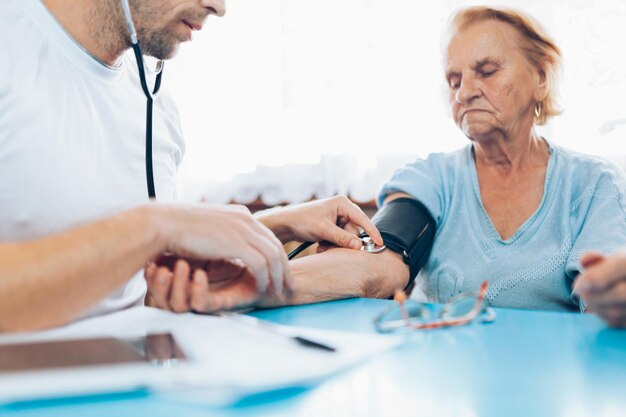Understanding the Connection Between Hypertension, Heart Disease, and Stroke: What You Need to Know
Imagine this: a silent storm brewing within, with no visible warning signs, yet possessing the potential to unleash devastating effects. This is the nature of hypertension—often called the "silent killer." Yet, it’s not the only concern; it’s closely linked to more serious health issues like heart disease and stroke. These three conditions are intertwined in ways that can dramatically impact your life. So, how exactly are they related, and what can you do to protect yourself? Let’s dive into the intricacies of these connections, providing you with valuable insights to empower your health journey.
Hypertension: The Silent Threat
What is Hypertension?
Hypertension, or high blood pressure, is a condition where the force of the blood against the artery walls is too high. Think of it as water rushing through a garden hose at high speed—potentially damaging everything in its path. Over time, this increased pressure can lead to severe health complications if left unchecked.
Causes and Risk Factors
Hypertension can be influenced by factors like genetic predisposition, lifestyle choices, and age. A diet high in salt, excess alcohol consumption, smoking, and a sedentary lifestyle all contribute to elevated blood pressure. While family history plays a role, lifestyle changes can significantly reduce risks.
Lifestyle tips to manage hypertension:
- Maintain a healthy diet: Opt for fruits, vegetables, and whole grains.
- Exercise regularly: Even a brisk 30-minute walk helps.
- Limit alcohol and quit smoking: Essential for lowering risks.
Heart Disease: A Close Companion to Hypertension
How Does Hypertension Lead to Heart Disease?
The heart continuously pumps blood through the arteries. When faced with high blood pressure, the heart has to work harder to pump blood, which can lead to the thickening of heart muscles. This condition, known as left ventricular hypertrophy, increases the risk of heart disease.
Types of Heart Disease
Heart disease is a collective term for several heart conditions, including coronary artery disease, heart attacks, and heart failure. Coronary artery disease is particularly significant as it involves the narrowing of heart arteries, a common consequence of prolonged hypertension.
Symptoms of Heart Disease
- Chest pain or discomfort
- Shortness of breath
- Fatigue or weakness
- Irregular heartbeat
Preventing Heart Disease
- Keep your blood pressure in check.
- Ensure regular cholesterol checks.
- Adopt a heart-healthy diet rich in omega-3 fatty acids.
Stroke: The Final Frontier of Hypertension
The Link Between Hypertension and Stroke
A stroke occurs when the blood supply to part of the brain is interrupted or reduced, preventing brain tissue from getting oxygen and nutrients. Hypertension is the leading cause of strokes as it can weaken blood vessels in the brain, causing them to leak or rupture. It may also lead to blood clots that block brain arteries.
Types of Stroke
Ischemic stroke is the most common type, caused by a blood clot blocking an artery. Hypertension can damage the arteries over time, increasing susceptibility to clot formation. Hemorrhagic stroke occurs when a blood vessel bursts, often due to uncontrolled high blood pressure.
Recognizing Stroke Early
- Sudden numbness or weakness in the face, arm, or leg, particularly on one side
- Confusion or difficulty speaking
- Trouble walking or loss of balance
- Severe headache without cause
Prevention Strategies
- Monitor and control blood pressure
- Maintain a healthy weight
- Engage in regular physical activity
The Interconnectedness of Hypertension, Heart Disease, and Stroke
Why Are These Conditions Related?
The relationship among hypertension, heart disease, and stroke is largely due to the circulatory system's vulnerability to pressure changes. Elevated blood pressure affects the arteries, weakening them and leading to plaque build-up (atherosclerosis). This build-up can restrict blood flow, leading to heart disease, or cause clot formation, leading to a stroke.
The Role of Lifestyle in Managing Risks
Your daily choices have a tremendous impact on your overall health. Incorporating a balanced diet, regular exercise, and stress management can significantly lower the risks of hypertension, heart disease, and stroke. Even simple adjustments, such as reducing salt intake or incorporating daily walks, can make a profound difference.
Empowering Yourself With Knowledge and Action
The first step in combating these interconnected health threats is to educate yourself. Understand your personal risk factors, whether they be genetics, lifestyle choices, or environmental influences. Regular health screenings are critical—they offer a snapshot of your current health and guide necessary interventions.
Empowering Tips for a Healthier Heart
- Stay informed: Keep updated on health screenings and be aware of changes in your body.
- Adopt a balanced lifestyle: Enjoy a nutrient-rich diet and keep active.
- Stress management: Incorporate activities like meditation or yoga.
Practical Steps You Can Take
- Monitor your blood pressure: Home monitors can help you stay aware.
- Educate your family: Share knowledge to encourage collective health.
- Seek regular medical advice: Consult professionals to tailor preventive measures.
Ultimately, while heart disease, hypertension, and stroke are formidable adversaries, they are not insurmountable. By staying informed and proactive, you can reduce your risks and maintain a healthier, more vibrant life.
Summary: Your Health, In Your Hands
- 🩺 Hypertension is known as the "silent killer": Regular check-ups are essential.
- ❤️ Heart disease and stroke are major complications: Linked to untreated high blood pressure.
- 🏃♂️ Lifestyle changes can mitigate risks: Exercise, a healthy diet, and stress management make a big impact.
- 🧠 Knowledge is power: Stay informed and proactive about your health.
- 🏥 Regular monitoring and medical guidance: Key to prevention and management strategies.

Related Articles
- Are Eggs Bad For Hypertension
- Are Endocrine Disorders Causing Hypertension Rare
- Can Alcohol Cause Hypertension
- Can Allergies Cause Hypertension
- Can Anemci People Get Hypertension
- Can Anemia Cause Hypertension
- Can Antibiotics Cause Hypertension
- Can Anxiety Cause Hypertension
- Can Asthma Cause Hypertension
- Can Atherosclerosis Cause Hypertension
